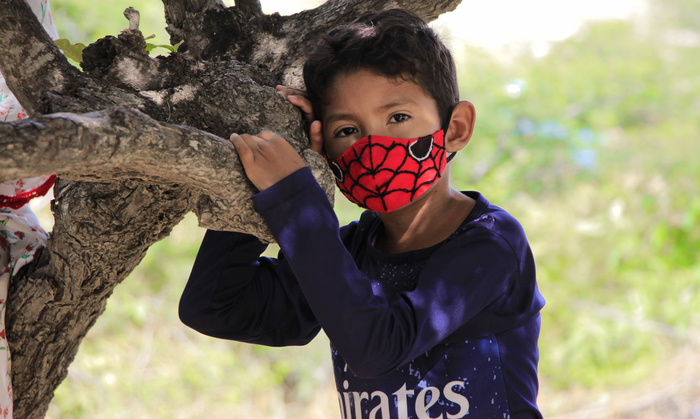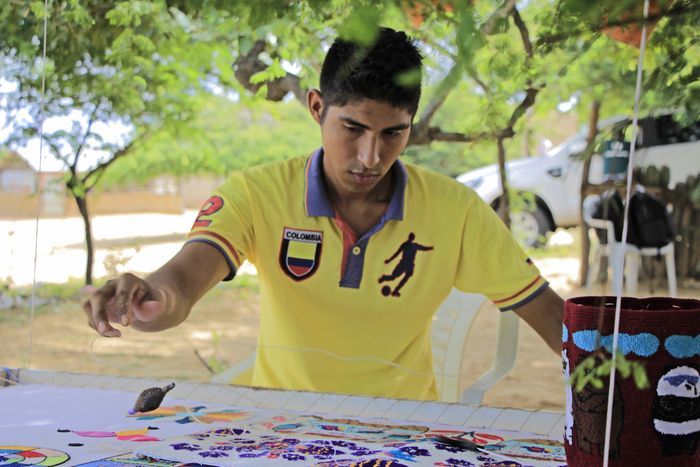 Stories
Stories
November 28, 2023 • 4 min read
Karen is a 33-year-old mother from Venezuela. "I thought everything was going to be fine in Venezuela, but the situation is getting worse and worse," she explained. Karen is one of two million Venezuelan refugees who have fled to neighbouring Colombia in recent years to escape violence and economic insecurity. An economic crisis in Venezuela has left many families like Karen's struggling to afford food, medicine, and basic services.
Lives Upheaved by Crisis
Karen and her family lived in Zulia, a state in Northwest Venezuela that borders Colombia. Karen was a teacher, and her husband, Michel, worked in IT. Together, they worked hard to support their seven-year-old son, Thiago. Thiago’s grandparents, Lucrecia and José, lived across the border in Riohacha, a Colombian city that has absorbed very high numbers of Venezuelan migrants in recent years. “Before, we never thought about emigrating,” Karen explains. “But we wanted a better quality of life… Life is expensive in Venezuela.”
Amid a worsening economic collapse, Karen’s husband lost his job. Karen began to knit backpacks to earn additional income while he searched for a new job, to no avail. Even after Michel found work on a farm, the couple was not earning enough money to support Thiago. When the Covid-19 pandemic hit, Karen was forced to make a heart-wrenching decision. Michel stayed behind to continue working as Karen and Thiago embarked for Colombia, where they hoped to reunite with Karen’s parents.

Karen’s seven-year-old son, Thiago
“It was during the rainy season, and the car was constantly breaking down. It took me a long time to get here. The journey lasted almost two days,” Karen recalls. She almost turned back when Thiago fell ill halfway through the journey, but she knew that she needed to persevere in order to give him a better life. Like many migrants who came before her, Karen refused to give up. After two days, Karen and Thiago arrived at the border, where guards informed her that she would only be allowed to enter the country if she did so on foot. Leaving her car and her belongings behind, Karen arrived in Maico, a Colombian border city, with nothing.
Supporting Venezuelan Refugees
Life is not easy for newly arrived Venezuelan migrants in Colombia. A lack of social support and legal residency makes it difficult to find work and leaves refugees susceptible to exploitation and discrimination. Informal refugee settlements are also vulnerable to natural disasters, such as landslides or storms. For two months, Karen relied on the generosity of strangers to care for Thiago, and the two lived together in a makeshift shelter. Once Michel earned enough money to join them in Maico, the family embarked for Riohacha.
GOAL teams have been working on the ground supporting local communities in the area since 2019. A centrepiece of that response is the Barrio Resiliente (Resilient Neighborhoods) programme, developed in partnership with USAID and Terre des Hommes. It’s a comprehensive approach to reducing risk to vulnerable refugees and host communities through skills training and economic development initiatives, among others. One programme component is Artesanías para el Rescate (Artisans to the Rescue).
A New Chapter
Karen knew how to knit, but she didn’t know enough about weaving or upholstery to make handicrafts her full-time job. “When I lived in Venezuela, I never paid any attention to handicrafts. I used to see my grandmother weaving, but I would just tell her that I was going to graduate and become a teacher. She would tell me that [learning how to weave] would be useful for me. I would like my grandmother to be here to teach me now,” Karen recalls, sadly.
Karen and Michel were approached by GOAL staff in Riohacha. “They gave us the good news that we could be a part of GOAL. With the training, they helped us to reinforce our knowledge about colours, fabrics, and textures…That is how they have given us their support,” Karen explains. The training Karen and Michel received allowed them to turn upholstery and weaving handicrafts into a stable, full-time job. GOAL staff also helped Karen’s family register for legal residency. “We said we had no papers, and they told us: ‘Well, let’s see what we can do for you,'” Karen says, smiling.

Karen’s husband, Michel, utilising the upholstery skills he learned under Artesanías para el Rescate (Artisans to the Rescue)
“Migrating is leaving the country, leaving the family, and everything behind to find a better quality of life,” Karen explains. Karen, Michel, Thiago, and Karen’s parents are happy in Colombia, but they hope to someday be able to reunite with their relatives who still remain in Venezuela. “I would like to go visit my aunt. My son also wants to see her… I want a better quality of life for my family.”
You can help support families like Karen’s, who are far from home this Christmas, with a donation today.
